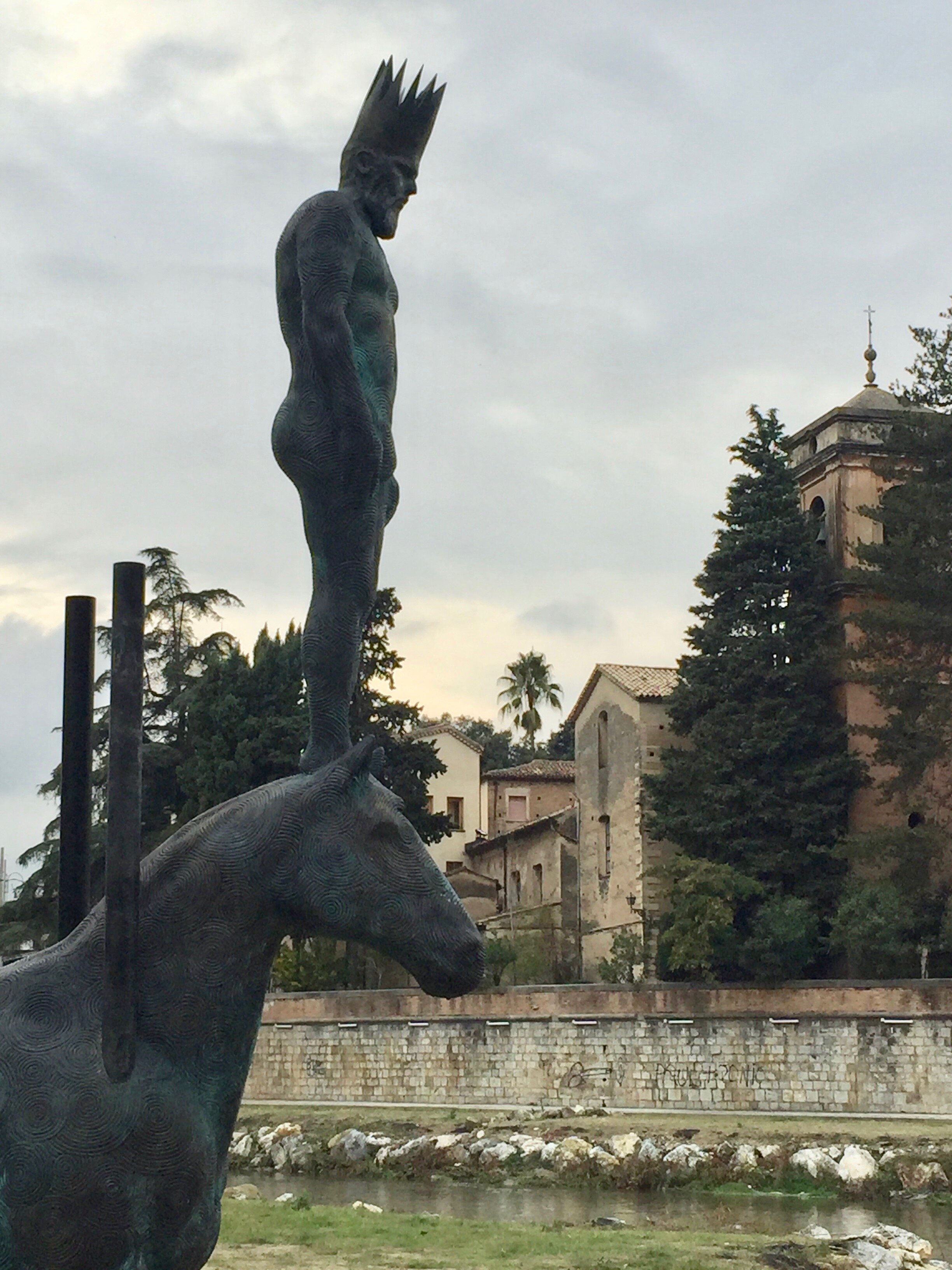Praise for Alaric the Goth!
⭐︎ Best of 2020 ⭐︎
The Economist
⭐︎ Named an Amazon Books ⭐︎
Best of Month for June
⭐︎ Selected by Forbes ⭐︎
Father’s Day Gift Guide
“A fascinating account of one of the most important—and misunderstood—leaders in Roman history. Douglas Boin…tells the story of a man fighting for respect and dignity in a world consumed by civil war, religious intolerance, ethnic prejudice, greedy self-interest, and treacherous politics. Boin brings Alaric’s world to life, and so brings Alaric to life. A must read for anyone who wants to understand the whole story of the fall of Rome.”
Mike Duncan
New York Times best-selling author of The Storm Before the Storm: The Beginning of the End of the Roman Republic
Alaric the Goth Has Been Featured At
The Paris Review (Contributor’s Favorites of 2020)
Lapham's Quarterly (June 2020)



Denied citizenship by the Roman Empire, a soldier named Alaric changed history by unleashing a surprise attack on the capital city of an unjust empire.
Stigmatized and relegated to the margins of Roman society, the Goths were violent “barbarians” who destroyed “civilization,” at least in the conventional story of Rome’s collapse. But a slight shift of perspective brings their history, and ours, shockingly alive.
Alaric grew up near the river border that separated Gothic territory from Roman. He survived a border policy that separated migrant children from their parents, and he was denied benefits he likely expected from military service. Romans were deeply conflicted over who should enjoy the privileges of citizenship. They wanted to buttress their global power, but were insecure about Roman identity; they depended on foreign goods, but scoffed at and denied foreigners their own voices and humanity. In stark contrast to the rising bigotry, intolerance, and zealotry among Romans during Alaric’s lifetime, the Goths, as practicing Christians, valued religious pluralism and tolerance. The marginalized Goths, marked by history as frightening harbingers of destruction and of the Dark Ages, preserved virtues of the ancient world that we take for granted.
The three nights of riots Alaric and the Goths brought to the capital struck fear into the hearts of the powerful, but the riots were not without cause. Combining vivid storytelling and historical analysis, Douglas Boin reveals the Goths’ complex and fascinating legacy in shaping our world.
Photography of the Danube Delta courtesy Abby Rennemeyer.

Denied citizenship by the Roman Empire, a soldier named Alaric changed history by unleashing a surprise attack on the capital city of an unjust empire.
As seen in The Washington Post
“The case for a path to citizenship for immigrants goes back to ancient Rome”
Read Doug’s essay from the October 15, 2021, edition of the Post: “Access to citizenship served both newcomers and the empire. Denying the possibility proved catastrophic” (Photo credit: iStock).
Alaric at the Art Institute of Chicago.
Doug joined Lisa Çakmak, curator of Ancient Mediterranean Art at the Art Institute of Chicago, in November 2020 to talk about the Goths, where they came from, and why their name has made such a lasting impression on art, architecture and style.
Who was allowed to call the Roman Empire home?
Read Doug’s May 2021 feature piece on the history of ethnicity and citizenship in Ancient Rome at Aeon.
Image credit: Detail of Battle against the Inhabitants of Veii and Fidenae (c1598), by Guiseppe Cesari, also known as the Cavaliere d’Arpino. The National Gallery, London. Courtesy Wikipedia.
Alaric at History Today.
In December 2020, readers of the popular print and online magazine History Today found Doug’s 3000-word essay, “The Goths Take Rome,” on its cover. The piece, which looks at the history of citizenship in the Roman Empire and tells the backstory to the Goths’ and Romans’ conflicts in Alaric’s day, is available here.
More Praise for Alaric the Goth
“Written in an enchanting and effortless style that transports you back in time, Douglas Boin’s Alaric the Goth masters the art of bringing the past to life in a thrilling fashion and making it relevant to today. An essential and scholarly page-turner.”
Sarah Parcak
Author of Archaeology From Space: How the Future Shapes Our Past
✧
“Boin paints a richly detailed portrait of the world in which Alaric manuevered, defined by the thrashings of an empire in turmoil….A cogent, readable text that vividly conveys the fears and confusion that surrounded the issue of immigrants’ rights in a period of declining Roman power.”
Wendy Smith
The Boston Globe
✧
“The most engaging parts of Alaric the Goth, and by far the greater portion of its contents, diverge from Alaric’s story to give a sweeping view of Roman life near the fall of the empire. It’s here, especially in matters of Christian-pagan tension, that Mr. Boin excels.”
James Romm
Wall Street Journal
✧
“An admirable history of a lesser-known Roman era….expert….revealing.”
Kirkus Reviews
✧
“This is a story of desperation and broken promises, pitting refugees from the north seeking homes, respect, and citizenship in an unwieldy empire already juddering with anti-immigrant fears, social upheavals, and political treachery. With deep research and insight, Boin traces the trajectory of cultural conflict from dashed hopes to devastation.”
Adrienne Mayor
Author of Gods and Robots
✧
“Anyone who appreciates vividly detailed stories of the past or is morbidly curious about the dying days of a wealthy, self-important, diverse, autocratic global power should pick this up.”
Sarah Rice
Booklist
✧
“A brilliantly readable account of the fall of the western Roman Empire, which for the first time spotlights not the Romans, but the Gothic invader Alaric. This is a story for our own age too. Douglas Boin asks us to take seriously the question of what would have happened if the tottering city of Rome had prioritized inclusive citizenship over paranoia and conflict; if it had built bridges rather than walls. This is urgent, gravid history, which will be read by anyone interested in empire, cultural conflict and the making of the modern narrative of the West.”
Tim Whitmarsh
Author of Battling the Gods: Atheism in the Ancient World
✧
“A remarkable feat of historical alchemy: a transmutation of the scanty and inadequate sources into the gold of a gripping narrative.”
Tom Holland
Author of Rubicon: The Last Years of the Roman Republic
✧
“Eye-opening….[Boin’s] brisk and well-documented account reveals the Roman Empire 50 years before its collapse as a decadent society rife with xenophobia and political conflict. This invigorating rehash of ancient times speaks clearly to the modern world.”
Publishers Weekly
✧
“An entertaining, highly readable account….a fresh approach….a work of noteworthy historical portraiture….a compelling, historically situated biography of the original King of the Visigoths….Boin writes in lyrical and breezy prose.”
Clayton Trutor, The New Criterion
✧
“Boin offers valuable insights into a culture that, while in crisis, was still vibrant, and provides tantalising glimpses into a frontier world that is so often glossed over. …[A] a finely crafted account of how Alaric became the embodiment of Rome's self-defeating fear of the world outside its frontiers.”
Philip Parker, Literary Review
✧
“Some books tilt the world so that you will never quite see it the same way again, and this is definitely one.”
Catherine Nixey, History Extra, BBC History Magazine
✧
“Boin published his book before the attack on the US Capitol, but his reading of the ancient past through the lens of contemporary trauma offers a fitting epitaph to a regime that did not fall but petered out – and a reminder that even a failed sack can be given meaning.”
Josephine Quinn, London Review of Books
✧
“Significantly reframes the stereotypical narrative.”
Daniel José Camacho, The Revealer
Alaric the Goth (Alarico el godo) is available in Spanish from Ático de los Libros, translated by Cristina Riera.
“[U]n libro de rabiosa actualidad,” La Vanguardia
”[U]na biografía donde [Boin] reivindica su figura y cuenta los motivos que le llevó a tomar la ciudad,” La Razón









